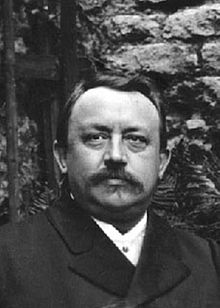Richard Pietschmann
Richard Ludwig Wilhelm Pietschmann (born September 24, 1851 in Stettin , † October 17, 1923 in Göttingen ) was a German librarian , orientalist and Egyptologist .
family
Pietschmann was born in 1851 as the son of the Szczecin sculptor Eduard Pietschmann (1819–1890) and his wife Leopoldine (1823–1879), b. Post, born in Szczecin.
Richard Pietschmann married Emilie Grüneklee (1869–1935) on August 13, 1892, the daughter of the Göttingen university fencing master Robert Grüneklee and his wife Marie, nee. Nightingale. A daughter was born to the couple, the microbiologist Katharina Meyer, b. Pietschmann.
Life
Pietschmann attended until 1870, the Marienstiftsgymnasium to Stettin and then studied in Berlin and Leipzig mainly philosophy , together with General Linguistics , Philology , Egyptology , Oriental , religion and art history . He heard from Adolf Bastian , Theodor Mommsen and Richard Lepsius, among others . His most important teachers in Leipzig were the geographer Oskar Peschel and the Egyptologist Georg Ebers ; Pietschmann became close friends with Ebers. In 1874 he received his doctorate at the philosophical faculty of the University of Leipzig with the work Hermes Trismegistos in Egyptian, Greek and Oriental traditions .
After completing his military service in his native city of Stettin, Pietschmann embarked on a career in librarianship and helped cataloging the Greifswald University Library until 1876 . Further stations were the university libraries of Breslau (until 1887) and, for a short time, Marburg , before he was transferred to the Göttingen university library in 1888 , where he worked as senior librarian from 1894. At the same time, from 1889 onwards he held an extraordinary, later full professorship at the University of Göttingen in the subjects of Egyptology and ancient oriental history . In this capacity he took over the management of various expeditions sent by Kaiser Wilhelm II .
In 1897 Pietschmann was accepted as a member of the Royal Society of Sciences . In the same year he received the Order of the Red Eagle . Since then he has also been a Privy Councilor .
In 1899 Pietschmann took over the post of director of the Greifswald University Library , was appointed department director at the Royal Library in Berlin in 1902 and on April 1, 1903, director of the Göttingen University Library. He held this post until his retirement in 1920. In Göttingen, Pietschmann was also a professor for library auxiliary sciences and, as chairman of the commission for the library specialist examination, headed the training for higher library service in Prussia.
On the occasion of a congress in Copenhagen in 1908 Pietschmann discovered the extensive and previously unknown manuscript by the Peruvian historian and ethnologist Waman Puma de Ayala (around 1535 / 1550–1615), which, with its numerous illustrations, shed a whole new light on the Inca empire after its publication and cast the period of conquest.
Pietschmann's estate is kept in the manuscript department of the Lower Saxony State and University Library in Göttingen.
Fonts
- History of the Phoenicians (= general history in individual representations . Main section 1, part 4, half 2). Grote, Berlin 1889.
literature
- Georg Leyh : Richard Pietschmann in memory. In: Central Journal for Libraries. Vol. 43, 1926, ISSN 0044-4081 , pp. 213-235; Addendum Vol. 44, 1927, pp. 189-190.
- Walter Menn: Richard Pietschmann. In: Martin Wehrmann , Adolf Hofmeister , Wilhelm Braun (eds.): Pomerania of the 19th and 20th centuries (= Pomeranian life pictures . Vol. 2). Saunier, Stettin 1936, pp. 388-393.
- Werner Schochow, in: Severin Corsten et al. (Hrsg.): Lexicon of the entire book system. LGB. Volume 6: Phraseology - Schütz-Hufeland. 2nd, completely revised and expanded edition. Hiersemann, Stuttgart 2003, ISBN 3-7772-0327-0 , p. 8.
Individual evidence
- ^ Richard Pietschmann: Nueva Coronica y buen gobierno of Don Felipe Guaman Poma de Ayala. A Peruvian illuminated manuscript. Preliminary notices. In: News of the K. Society of Sciences in Göttingen. Philological-historical class. 6, 1908, ZDB -ID 505052-2 , pp. 637-659.
- ↑ Informe del Manuscrito iluminado de Don Felipe Guamán Poma (PDF; 197 kB) Pietschmann (1912) Introducción, notas y traducción del alemán al castellano por el Dr. Alfredo Alberdi Vallejo.
Web links
- Literature by and about Richard Pietschmann in the catalog of the German National Library
- Works by and about Richard Pietschmann in the German Digital Library
- Search for Richard Pietschmann in the SPK digital portal of the Prussian Cultural Heritage Foundation
- Correspondence between Richard Pietschmann and Eduard Meyer
| predecessor | Office | successor |
|---|---|---|
| Karl Dziatzko | Director of the Göttingen University Library 1903–1920 |
Richard Fuck |
| personal data | |
|---|---|
| SURNAME | Pietschmann, Richard |
| ALTERNATIVE NAMES | Pietschmann, Richard Ludwig Wilhelm |
| BRIEF DESCRIPTION | German librarian and orientalist |
| DATE OF BIRTH | September 24, 1851 |
| PLACE OF BIRTH | Szczecin |
| DATE OF DEATH | October 17, 1923 |
| Place of death | Goettingen |

